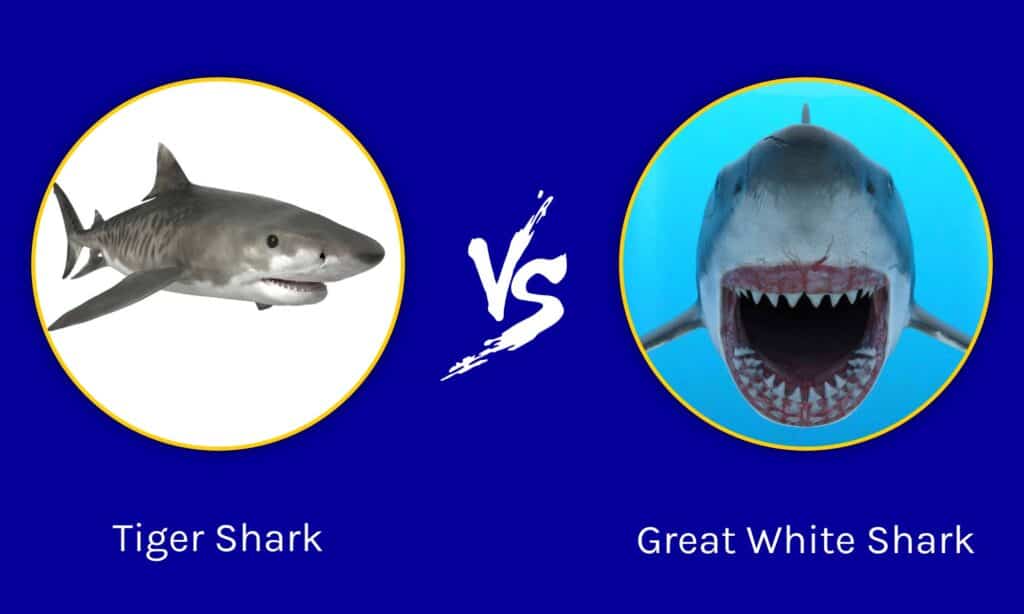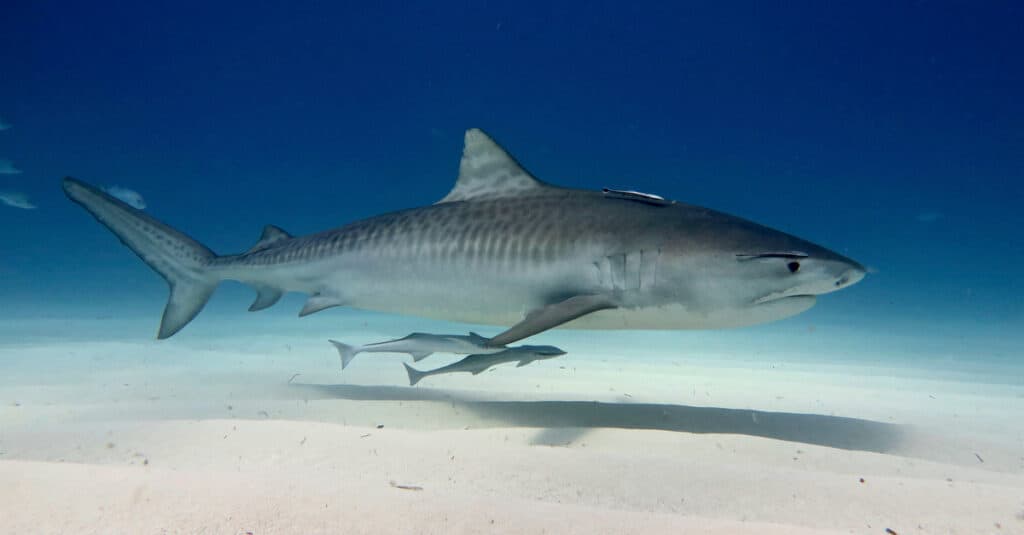When people think of the most powerful animals in the world, it’s hard to imagine a fish belonging to that list. Yet, the great white shark might just be the perfect killing machine in the world today. This shark terrorizes the waters, hunting prey with ruthless precision. Great white sharks aren’t alone in the ocean, though. Tiger sharks also lurk in the deep, eating a wide variety of creatures and using their camouflage for hunting their prey. What happens if these two animals fight? We will examine a tiger shark vs great white shark fight and show you the winner!
Comparing a Tiger Shark and a Great White Shark

| Tiger Shark | Great White Shark | |
|---|---|---|
| Size | Weight: 850lbs-1,400lbs Length: 10ft-14ft | Weight: 2,000lbs-5,000lbs Length: 18ft – 26ft |
| Speed and Movement Type | – 20 mph – Has higher burst speed when closing on prey, close to 30 mph | – 15 mph-25 mph – Undulating, side-to-side motion for the tail and body. |
| Defenses | – Size – Speed – Stripes that offer camouflage when they are below a prey | – Large size – Bursts of swim speed – Great senses that help it find or avoid other animals |
| Offensive Capabilities | – Possess 48 teeth – Broad, serrated teeth – Powerful bite, but not as strong as a great white – Teeth grow 1.5in-2in | – 4000 PSI Bite Power – About 50 serrated teeth are available to bite in the first row, but 300 teeth overall – 2-4-inch-long teeth – Uses speed, size, and raw power to inflict devastating wounds on prey |
| Predatory Behavior | – Ambush predators that move slowly when hunting and then quickly overwhelm their prey – Relies on their camouflage to get close to prey | – Both an opportunistic and ambush predator that often strikes from below an enemy |
What Are Key Differences Between a Tiger Shark and a Great White Shark?

Great white sharks are massive fish with a deadly bite.
©Martin Prochazkacz/Shutterstock.com
The greatest differences between a tiger shark and a great white shark are their morphology and size. The great white shark is a massive cartilaginous fish weighing up to 5,000lbs and growing 20ft long with a pointed head, a solid dark gray color on top and white bellies, and tail fins of even length. A tiger shark is a sizeable fish weighing up to 1,400lbs and measuring 14ft with a blunt, wedge-shaped head, an upper tail fin that is longer than the bottom, and tiger-like stripes on the top of its gray body.
These differences are significant, and they can help tell us to tell these animals apart. Yet, we have to look a little closer at these animals to determine which of them is the true apex predator in the water.
What Are the Key Factors in a Fight Between a Tiger Shark and a Great White Shark?

Tiger sharks are hard to spot when looking from above.
©HQuality/Shutterstock.com
The biggest factors in a fight between a tiger shark and a great white shark all come down to their physical abilities. These sharks are similar in the ways they hunt and kill, so we have to get granular and look at which animal has the most advantages in size, speed, defense, and attack. Let’s look at how these animals measure up compared to one another.
Tiger Shark vs Great White Shark: Size
A great white shark is larger than a tiger shark by quite a bite. A great white shark can weigh between 2,000 and 5,000lbs and measure over 20ft in some cases. Even larger sharks may be in the oceans right now! Tiger sharks are still large creatures. They can weigh upwards of 1,400lbs on average and measure up to 14ft long. The largest tiger shark recorded was 1,700lbs and 13ft long, but even that is small compared to a great white.
The great white shark has the size advantage in this fight.
Tiger Shark vs Great White Shark: Speed and Movement
Great white sharks have a higher observed speed compared with tiger sharks. Great white sharks reach speeds of up to 25 mph in the water, but a tiger shark can move around 20 mph with greater speed bursts possible. However, neither shark can maintain that speed for long.
Great white sharks have the speed advantage.
Tiger Shark vs Great White Shark: Defenses
The great white shark uses its speed, size, and senses to keep it safe in the ocean waters. It can usually tell when something is nearby due to its ampullae of Lorenzini, organs that let them sense electrical currents in their prey.
Tiger sharks are similar in that they rely on their size and speed to ward off threats, but they have even better camouflage on the top portion of their body. As their name suggests, tiger sharks have stripes that make it hard to spot them when prey looks down upon them.
Tiger sharks have better defenses since their camouflage is even better than a great white shark’s camouflage.
Tiger Shark vs Great White Shark: Offensive Capabilities
Few animals in the world have a bite that matches the great white shark, a fish that is estimated to put forth a bite power of 4,000 PSI. The shark’s bite is enhanced by its long teeth that can measure up to 4 inches in length and 2 inches wide.
With over 300 serrated, sharp teeth in their mouths, a bite from a great white can be instantly fatal. Their senses, instincts, speed, and power factor into their assault, too.
Tiger sharks are also powerful, but they have only 48 teeth with which to bite, and they can measure 2 inches long! The teeth are broad and serrated, perfect for taking a huge bite out of prey.
Tiger Shark vs Great White Shark: Predatory Behavior
Great white sharks are amazing predators. They can be opportunistic or ambush predators, preferring to attack from the depths to get at a creature’s vulnerable portions. Tiger sharks use their camouflage to great effect, ambushing prey from the depths. However, they are very careful when attacking, creeping to get close to their prey before making a move.
Both sharks are equally effective at hunting their prey.
Who Would Win in a Fight Between a Tiger Shark and a Great White Shark?

The great white shark is too large for a tiger shark to kill.
©Fiona Ayerst/Shutterstock.com
A great white shark would win a fight against a tiger shark. The great white shark is too large and powerful for the smaller tiger shark to overcome. Even though the tiger shark would have difficulty ambushing the great white, unless it managed to deal a devastating blow to the bigger fish, it would be setting itself up for a bad counterattack.
The more realistic version of this fight is the two come to blows over a meal, taking turns biting and fleeing from one another. Although the tiger shark may be sleeker and have a smaller profile, it’s also slower than the great white shark.
In a straight-up battle to the finish, the bigger, stronger, deadlier great white is going to win.
Could a Great White Beat an Orca in a Fight?

©Guillermo El Oso/Shutterstock.com
Great white sharks may be the most vicious fish in the sea, but that doesn’t mean that there’s not a few aquatic mammals who can put up a good fight with them. Orcas, also known as killer whales, have been known to kill and eat several species of sharks. Since these whales possess a far superior bite force than a great white, as well as a deeper intelligence and greater speed, it is more than likely that an orca would defeat any great white in a one-on-one battle. Sharks are also severely disadvantaged when it comes to their ability to maneuver in battle because of their system of respiration, known as obligate ram ventilation, which forces them to constantly swim with their mouths open in order to filter water through their gills. This means that the orca would be able to swim circles around this comparatively clumsily shark before it was able to launch a fatal attack.
The photo featured at the top of this post is © iStock.com/Divepic
Thank you for reading! Have some feedback for us? Contact the AZ Animals editorial team.







